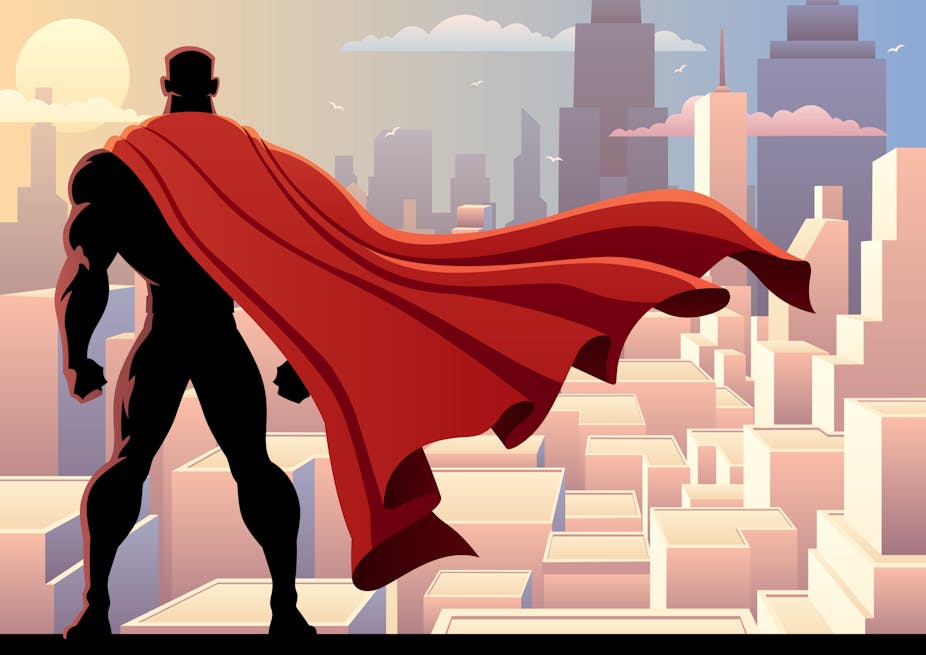Our appetite for stories about heroes never lets up. While the remake of Ben-Hur does battle at the box office, 20th Century Fox is making an adventure film about Stan Lee, the man behind the Marvel superhero comics. Meanwhile, we recently commemorated human heroes in anniversaries for the September 11 attacks and the Battle of the Somme.
But why do people identify with heroes? What drives heroism? I have co-authored two recent papers that suggest our affinity for heroes and heroism might be linked to concerns about our mortality. Think of Batman battling the criminal underbelly of Gotham City after the death of his parents, for example. It is one of many well known stories that hint at how concerns about death can foster heroism.
Our work draws on an idea from social psychology called terror management theory. This suggests that subconscious thoughts about our mortality can lead us to cling to beliefs or values that give our lives meaning and a sense of permanence.
The beliefs might be about immortality, in the form of religion and an afterlife. Or they might be a proxy that stands above our individual existence, such as the nation state or a prevailing culture. How well we live up to these beliefs is thought to determine our self-worth. And when something reminds us of our mortality, we identify more strongly with these beliefs and try harder to live up to them.
The research
We were interested in how heroes fitted this picture. We had noted that heroes are often paragons of cultural value. Since terror management theory says we adopt such values as an existential safety blanket, it would make sense that heroes should be a way of keeping death thoughts at bay. Being reminded of death should also make us value heroes more and encourage us to behave like heroes ourselves.
We ran studies to test these hypotheses. To test the proposition that we value heroes more after being reminded of our mortality, we divided 160 mixed-sex participants into two groups. One group was asked to write about their death. For comparison, the other had to write how they felt about uncertainty.
We then divided everyone into two new groups and asked them to complete sets of sentences. One group’s sentences needed a particular self-focused personal pronoun – for example “Please don’t do this to (me, my, I), it is just not fair”. The other group’s options were pronouns about other people – “After spreading fertiliser liberally over the flower bed, (he, she, they) watered the flowers”, for example.
This exercise gets people either to focus on themselves or on others. Since previous research suggests that people’s heroes form part of their identity, we assume they are more likely to identify with those heroes while focused on themselves.
Lastly, all our participants had to think of a hero and their relationship with them. They were all asked to choose from one of seven Venn diagrams. Each had two circles containing the words “self” and “hero”, but with different degrees of overlap. We found that participants who had written about their death and then been focused on themselves identified substantially more with their hero.

We then did a follow-up study to see whether thinking about a hero could mitigate people from thinking about their mortality. We divided 136 mixed-sex participants into two groups in which one wrote about their death and the other wrote about something else – pain, in this case. Then we created three new groups. One had to write about a personal hero, another about someone else’s hero, and the last group about an acquaintance.
All participants were then given a series of word stems that could be completed with either death-related words or other words, for example “coff–” could be “coffin” or “coffee” – a common way of testing the extent to which a person is thinking about their mortality.
Of the participants who had written about their death, the ones who had then had to write about their personal hero were substantially less likely to use mortality words than the ones who wrote about either someone else’s hero or an acquaintance.
For the last test, we turned to our proposition that death thoughts may make people behave more heroically. We tested heroism by considering one of its classic traits – sacrifice. Given heroes often make sacrifices by enduring pain, we used what’s called a cold pressor task, where participants submerge their hands in painful freezing cold water. This time all 160 participants were male (women have different responses to pain, so this would have influenced the findings).

Again we divided participants into two groups, one wrote about their death and the other about failing an exam. Then two new groups were given (bogus) explanations for doing the cold pressor task. One group was told the study was assessing the relationship between pain and heroism because the more someone can endure pain, the more likely they are to be heroic. For the other group, “positive personality” was substituted for “heroism”.
For the cold pressor, everyone reported every 15 seconds on a ten-point scale the intensity and unpleasantness of the pain. Again the predictions were borne out: participants who were reminded about death and told that pain endurance was linked to heroism reported substantially less pain.
What it means
All our findings supported what we had predicted. It suggests for the first time that being aware of your mortality can help you identify with heroes and/or behave heroically; and that your heroes help to defend against the existential concern of death.
So perhaps there is some hint of a psychological truth in Batman donning the suit after his parents’ death. Our participants might not have been out fighting crime or swinging from the rooftops – getting ethical approval for that wouldn’t be easy. But we consistently found that the links between heroism and death were compelling. No wonder heroes play such a prominent part in our culture.

